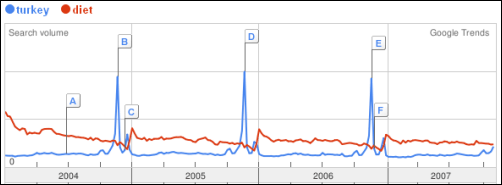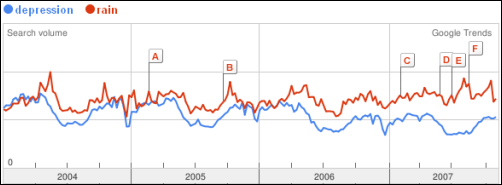* ebay-google.com
* googlewarnerbros.com

An Experiment with PDF Ads Via YahooTf 3.SamllcoverKevin Kelly is trying out a new ad insertion program with his book "True Films". His write up is interesting and Kevin's always thoughtful about these things.Earlier editions of this book have been available on Amazon, Lulu, and as a cheap download from my site. But with this new version 3.0 I am trying something new. I am offering this 200-page full-color guide (perfect as a companion if you have Netflix) as a FREE download. It's in PDF format, but with a twist. To help offset the significant bandwidth costs of these downloads (I hope my server can take the wave), I have appended advertisements to the PDF book. Here is how the ads work:If you choose to see the ads, they will appear in a gray sidebar on the right, adjacent to the pages of the book, just outside the frame of the page.....These ads are inserted into the PDF by Adobe (using the Yahoo ad network) when you open the file. Like Google Adsense ads, they are contextual.John Battelle's Searchblog: An Experiment with PDF Ads Via Yahoo
Blogged with Flock
Narayen takes over as Adobe, best known for Photoshop photo software and Acrobat and PDF digital document tools, is shifting many of its wares from boxed software to online services.
Adobe, which celebrates its 25th anniversary on Dec. 13, is a Web powerhouse with its Adobe Reader and Flash software. Narayen spoke with USA TODAY's Jefferson Graham about Adobe's transition, and why he believes two new initiatives for 2008 — Adobe's Media Player and AIR, which connects desktop applications with the Web — have the potential to transform the $3 billion company.
Q: Let's start by talking about your background. I understand you grew up in India and are an engineer by training?
A: I have two engineering degrees and a business degree. I worked in the networking group at Apple and then joined Silicon Graphics. In 1995, everyone was doing start-ups. I wanted to help transfer analog photography to digital and co-founded a company called Pictra. We were a little ahead of our time and ended up partnering with Adobe. I joined Adobe in 1998, running the engineering technology group. Bruce started asking me to do more, and as he's grown, so have I.
Q: Do you still think of yourself as an engineer?
A: I've been running products and marketing since 2001, but building great products is my first love.
Q: Adobe is in an interesting place right now. The company is making a transition from boxed software to online, "cloud" computing. Can you talk about that?
A: We want to marry the power of the desktop with the Web.
Q: You're talking about AIR, Adobe's new desktop-meets-the-Internet application?
A: Yes. Look at what (Apple's) iTunes does, you never know when you're online or offline. For the user, it's a seamless experience. We want to overcome some of the barriers that exist with a browser, to let people access maps, recipes and sports scores, for instance, in an application that sits on your desktop.
Q: How does that work?
A: We have an example from eBay (EBAY) on our labs.adobe.com site. Offline, you get to specify what you're interested in — specific auctions — and they are constantly updated, without you having to go to eBay.com. The application has a richer, graphical look.
Q: When will AIR be available?
A: In the first quarter, along with the Adobe Media Player.
Q: This is your answer to Windows Media Player?
A: In a sense. It showcases our Flash video (tool) in DVD-like quality. Seventy percent of the video you see online today is Flash, and a number of our customers would like to be able to show Flash offline. They'd like to put branding in a player, so if you watch NBC's Heroes TV show, Heroes information and ads can be in the body of the player.
Q: How do you make money from these products?
A: To get the most out of them, companies will need to buy our software. If you look at the history of Adobe, we delivered PostScript, a technology platform, and monetized it through Illustrator (layout software) and Photoshop. We delivered PDF document technology and monetized it through Acrobat.
Q: Let's talk about cloud computing. Adobe now has Internet versions of Premiere Elements video-editing software on MTV.com and YouTube. A "lite" online version of Photoshop is coming next year. Why are you going in this direction?
A: This is a low-barrier way to try our software; it exposes people to try our products. We can do this now because broadband is better, and we've been able to re-engineer our products to work on a server.
Q: What Adobe software do you use on a daily basis?
A: Digital photography is one of my passions. I own a Sony Alpha digital camera and consider myself an advanced hobbyist. I spend time with Photoshop on image management and touchup. I like to use Creative Suite 3 to take multiple pictures and combine them into one. It's a lot of fun.
Blogged with Flock

Blogged with Flock
Google Trends shows an interesting search popularity graph for the queries “turkey” (as in turkey the food, too) and “diet”:

On North-American Thanksgiving day, the searches for a traditional dish for the festivity peak. There’s still Xmas ahead with a second, milder peak for turkey queries... afterwards, searches for a diet are building up, peaking right after on New Year.
There’s an interesting other correlation... between depression and rain:

Blogged with Flock
3,3,3,3,3,3,3,3,3,3,3,3,3,3,3,4,4,3,0,4,4,4,3,4,3,4,3,3,3,3
3,3,3,3,3,3,3,3,4,3,4,4,4,0,4,2,2,2,2,2,2,2,0,2,2,0,4,3,3,3
3,3,3,3,3,3,3,3,2,2,2,2,0,1,2,2,1,2,1,1,1,2,2,2,2,2,4,3,3,3
3,3,3,3,3,3,2,2,2,1,2,1,1,1,1,1,1,1,1,1,1,1,1,1,1,2,4,3,3,3
3,3,3,3,3,3,4,1,1,1,1,1,1,1,1,1,1,1,1,1,1,1,1,1,1,2,4,3,3,3
3,3,3,3,3,3,4,2,1,1,1,1,1,1,1,1,1,1,1,1,1,1,1,1,1,2,4,3,3,3
3,3,3,3,3,3,3,2,1,1,1,1,1,1,1,1,1,1,1,1,1,1,1,1,1,2,4,3,3,3
3,3,3,3,3,3,3,2,1,1,1,1,1,1,1,1,1,1,1,1,1,1,1,1,1,2,4,3,3,3
3,3,3,3,3,3,3,2,1,1,1,1,1,1,1,1,1,1,1,1,1,1,1,1,1,2,4,3,3,3
3,3,3,3,3,3,3,4,1,1,1,1,1,1,1,1,1,1,1,1,1,1,1,1,1,2,4,3,3,3
3,3,3,3,3,3,3,4,2,1,1,1,1,1,1,1,1,1,1,1,1,1,1,1,1,2,4,3,3,3
3,3,3,3,3,3,3,3,2,1,1,1,1,1,1,1,1,1,1,1,1,1,1,1,1,1,4,3,3,3
3,3,3,3,3,3,3,3,2,1,1,1,1,1,1,1,2,1,1,1,1,1,1,1,1,1,2,3,3,3
3,3,3,3,3,3,3,3,2,1,1,1,1,1,2,2,4,4,2,2,1,2,2,2,2,2,2,3,3,3
3,3,3,3,3,3,3,3,4,1,1,1,1,2,4,3,3,3,3,4,2,4,3,3,3,3,2,3,3,3
3,3,3,3,3,3,3,3,4,1,1,1,2,4,3,3,3,3,3,3,2,3,3,3,3,3,4,4,3,3
3,3,3,3,3,3,3,3,4,2,1,1,2,3,3,3,3,3,3,3,4,3,3,3,3,3,3,4,3,3
3,3,3,3,3,3,3,3,3,2,1,1,2,3,3,4,4,3,3,3,4,4,3,3,3,3,3,4,3,3
3,3,3,3,3,3,3,3,3,2,1,1,2,3,3,2,4,3,3,3,4,0,0,2,2,4,3,4,3,3
3,3,3,3,3,3,3,3,3,2,1,1,1,4,3,3,3,3,3,3,2,1,1,1,1,2,2,3,3,3
3,3,3,3,3,3,3,3,3,2,1,1,1,2,4,3,3,3,3,2,1,1,1,1,1,2,2,3,3,3
3,3,3,3,3,3,3,3,3,2,2,1,1,1,1,2,4,2,2,1,1,1,1,2,2,2,2,3,3,3
3,3,3,3,3,3,3,3,4,2,2,1,1,1,1,1,1,1,1,1,1,1,1,2,2,1,2,3,3,3
3,3,3,3,3,3,3,3,2,1,0,1,1,1,1,1,1,1,1,1,1,1,1,1,1,1,2,4,3,3
3,3,3,3,3,3,3,3,4,2,2,1,1,1,1,1,1,1,1,1,1,1,1,1,1,1,2,4,3,3
3,3,3,3,3,3,3,3,3,4,0,1,1,1,1,1,1,1,1,1,1,1,1,1,1,1,2,4,3,3
3,3,3,3,3,3,3,3,3,3,2,1,1,2,1,1,1,1,1,1,1,1,1,1,1,1,2,3,3,3
3,3,3,3,3,3,3,3,3,3,2,1,1,2,2,2,2,2,2,2,2,2,2,2,2,2,4,3,3,3
3,3,3,3,3,3,3,3,3,3,2,1,1,1,1,1,1,1,2,2,4,4,4,3,3,3,3,3,3,3
3,3,3,3,3,3,3,3,3,3,1,1,1,1,1,1,1,1,2,4,3,3,3,3,3,3,3,3,3,3
3,3,3,3,3,3,3,3,3,0,1,1,1,1,1,1,1,1,2,3,3,3,3,3,3,3,3,3,3,3
3,3,3,3,3,3,3,3,4,0,2,1,1,1,1,1,1,1,2,3,3,3,3,3,3,3,3,3,3,3
3,3,3,3,3,3,4,0,0,0,0,2,1,1,1,1,1,2,0,0,2,4,4,3,3,3,3,3,3,3
3,3,3,3,4,0,0,0,0,0,0,0,0,0,2,0,0,0,0,0,0,0,0,0,4,3,3,3,3,3
3,3,3,4,0,0,0,0,0,0,0,0,0,0,0,0,0,0,0,0,0,0,0,0,0,3,3,3,3,3
3,3,3,0,0,0,0,0,0,0,0,0,0,0,0,0,0,0,0,0,0,0,0,0,0,4,3,3,3,3
3,3,4,0,0,0,0,0,0,0,0,0,0,0,0,0,0,0,0,0,0,0,0,0,0,2,2,4,3,3
3,3,4,2,1,1,2,0,0,0,0,0,0,0,0,0,0,0,0,0,0,0,0,0,2,1,1,2,4,3
3,3,2,1,1,1,1,1,0,0,0,0,0,0,0,0,0,0,0,0,0,0,0,0,2,2,1,1,2,4
3,4,1,1,1,1,2,2,2,0,0,0,0,0,0,0,0,0,0,0,0,0,0,2,2,2,1,1,1,2
3,2,1,1,1,1,1,1,2,2,0,0,0,0,0,0,0,0,0,0,2,1,1,1,1,1,1,1,1,1
3,2,1,1,1,1,1,1,1,1,1,1,2,0,0,0,0,0,0,2,1,1,1,1,1,1,1,1,1,1
3,2,1,1,1,1,1,1,1,1,1,1,1,1,2,0,0,0,0,1,2,1,1,1,1,1,1,1,1,2
3,4,2,1,1,1,1,1,1,1,1,1,1,1,1,1,0,0,2,2,1,1,1,1,1,1,1,1,2,2